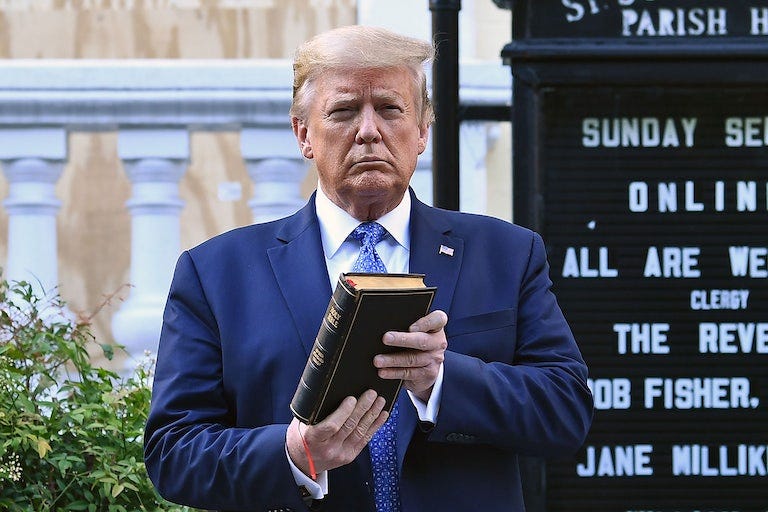On 2016.
How the church's desire to Make America Great Again affected my faith.
In 2016, I was processing the murders of Alton Sterling and Philando Castile and the brutality Black people in America face. My husband was an undocumented immigrant and DACA recipient awaiting residency.
And he worked at an evangelical megachurch.
This isn't a post where I'll air a list of grievances, though it could be. I've spent enough time in therapy to make peace with many of the things I've experienced. I struggle to articulate how we experienced the very best and worst of people at the same place. I met some of the kindest people I've ever known in our two years there. I also experienced more micro-aggressions than I knew possible, leaving me unsure that Christianity was for me.
Back to 2016. Donald Trump was running for president, and it felt like a long shot. I couldn't imagine anyone, let alone any Christian, voting for such a mean man. When the "grab them by the p***y" tape leaked the month before the election, I knew it was over for Trump.
We all know how the story ends. 81% of white evangelicals voted for him, a number that I didn't have to Google because it has stuck with me since I first read it. I vividly remember sitting on our apartment couch, quietly feeling dread.
I was worried about my LGBTQ+ and Muslim friends. I was scared for myself. And I was terrified for my husband, unsure whether he'd be at risk of deportation. I cried with coworkers when I went to work the day after the election. When I went to church, it was business as usual. Our church even invited Ben Carson to speak at a service. (I shared my concerns online and was subsequently rebuked by a pastor, but that's a story for another day.)
It was the first time I faced the reality that the "worldly" people I'd been warned about were more inclusive than those I took communion with on Sundays. I'd always known it deep down, but it wasn't until then that I reckoned with it. As a Black woman, I felt safer with my friends who had no interest in God.
I've written about the nuances of faith elsewhere. I maintain that broadening my worldview and learning from LGBTQ+, feminist, and Black theologians shifted my views toward a radically welcoming religion — the kind I desperately wanted back then.
I know I'm not alone in this. I've had conversations with countless friends who felt the same distaste seeing the American church choose "pro-life" virtues over the most vulnerable members of society. Democrats don't have a perfect human rights track record, for what it's worth — but the cruelty that Trump espoused was nearly unbelievable.
The next presidential election is quickly approaching, but I obviously won't approach it with the optimism of 2016. I kept my faith in Jesus despite losing my faith in the church. That's okay for me.



I made like a 10 minute video for a friend last week explaining my thoughts and it’s almost identical to your sentiments here. I had a faith crisis that started in 2016 after the leaked audio and in 2020, that crack lead me to deconstruct because how could i believe in the same God as all these “Christians” who think a rapist and racist is the best person to run a country? How could the “least of us” be thrown to the wolves because they hope cheese is cheaper next year? Anyway, that lead to me reading the Bible front to back. Twice. And somehow I still kept my faith- even though I feel like the only reason I have it is because I don’t know how not to have faith? What do people do when they worry about their children’s safety? For me, it’s always been prayer and I’m not sure my anxiety can get through not having “something” to lessen my stress. Anyway, after this week, I keep saying in my mind: “how can their God and my God be the same one?” What Bible are they reading? And how have they done the mental gymnastics to make it ok for them to lay their head down at night with a clear conscience? I hope I’m making sense but I just want to say: holy shit, I feel the same way. I live in a small, “Christian” town in the south and am surrounded by other Christians who have been gloating all week. I’m just lost….
Thanks for sharing, Ayana. I, as you’d expect, had a similar experience in my own evangelical megachurch at the time.